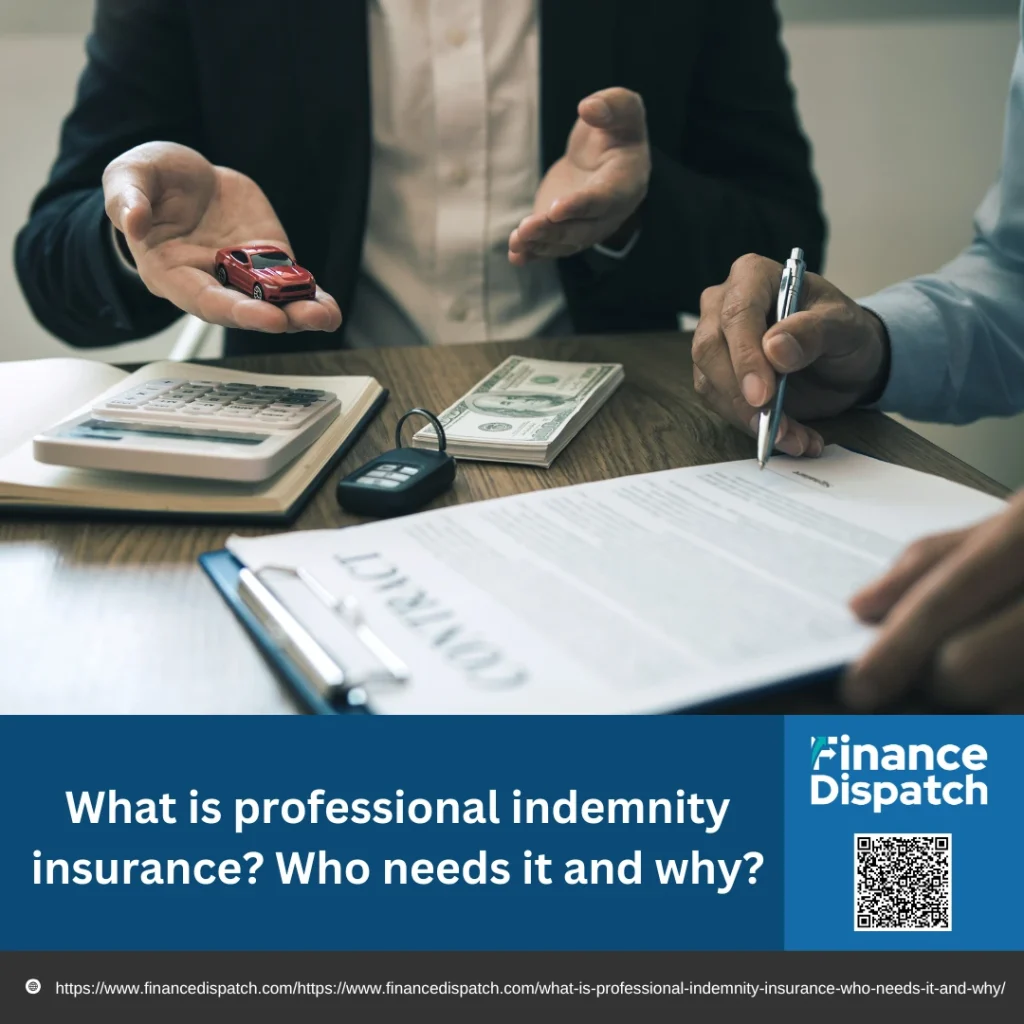In today’s professional landscape, even the most skilled and experienced individuals can make mistakes—and those errors can lead to costly legal claims. That’s where professional indemnity insurance comes in. Whether you’re an architect, consultant, accountant, or creative freelancer, offering advice or services to clients carries a level of risk. Professional indemnity insurance helps protect you from financial fallout if a client claims your work caused them a loss. In this article, we’ll break down what professional indemnity insurance actually is, who needs it, and why it could be one of the smartest investments you make for your business or career.
What is Professional Indemnity Insurance?
Professional indemnity insurance is a type of business insurance designed to protect professionals who provide advice, services, or designs to clients. If a client alleges that your work caused them financial loss—due to an error, omission, or negligent advice—this insurance helps cover your legal defence costs and any compensation that may be awarded. It applies even if the service was provided for free. Whether you’re self-employed or part of a larger organisation, this cover acts as a financial safeguard against unexpected claims that could otherwise be damaging to your reputation and bottom line.
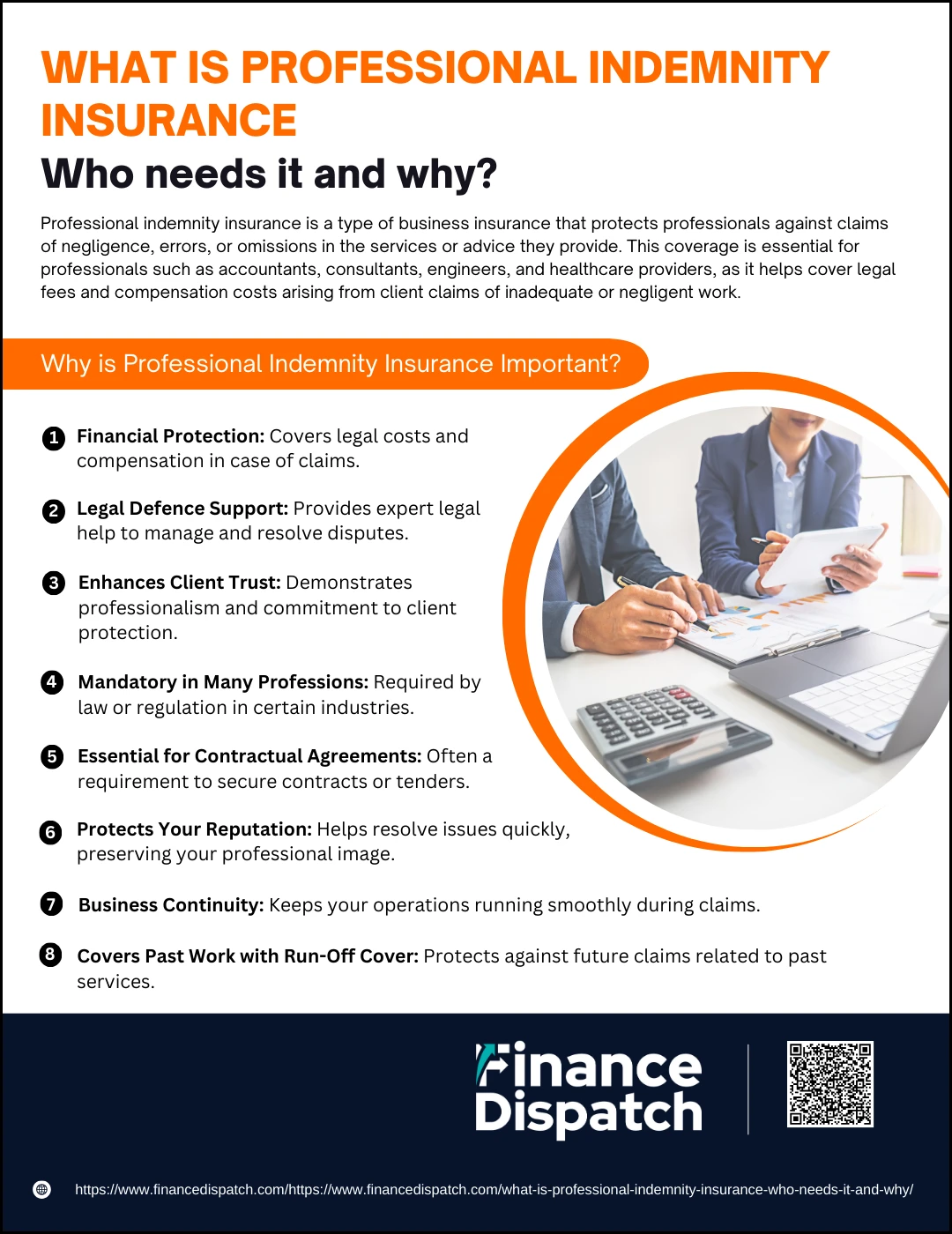 Why is Professional Indemnity Insurance Important?
Why is Professional Indemnity Insurance Important?
In today’s competitive and litigious business environment, providing professional services or advice comes with inherent risks. A simple oversight, miscommunication, or error can result in a claim that costs you more than just money—it can harm your reputation and threaten the future of your business. This is where professional indemnity insurance becomes essential. It offers a safety net, ensuring that professionals are protected from the financial and legal consequences of claims made by dissatisfied clients.
Here’s a closer look at why having professional indemnity insurance is so important:
1. Financial Protection
Defending a claim—whether justified or not—can be extremely costly. Professional indemnity insurance covers legal expenses, court fees, and any compensation or settlement payments awarded to the client. Without this coverage, you would be personally or professionally liable, which could significantly affect your finances or even lead to bankruptcy in severe cases.
2. Legal Defence Support
Claims can be complex and time-consuming to resolve. PI insurance provides access to expert legal teams who can handle the intricacies of your case, from court representation to negotiations. This not only saves you money but also helps ensure a smoother, more professional resolution process.
3. Enhances Client Trust
Clients want to know that if something goes wrong, you’re prepared to make it right. Having professional indemnity insurance signals that you take your responsibilities seriously and are committed to upholding high standards. It shows clients that you are a credible, trustworthy professional who plans for every eventuality.
4. Mandatory in Many Professions
For certain regulated professions—such as solicitors, accountants, architects, and financial advisers—professional indemnity insurance isn’t just a recommendation; it’s a requirement. Regulatory bodies often specify minimum coverage levels as a condition of membership or licensing, ensuring that clients are protected in case of professional mistakes.
5. Essential for Contractual Agreements
Many clients, particularly in the corporate and public sectors, won’t sign a contract or award a project unless you can provide proof of adequate PI insurance. It’s often a non-negotiable part of the tendering or procurement process, meaning not having it could cost you valuable business opportunities.
6. Protects Your Reputation
A legal dispute, if not handled correctly, can tarnish your professional image. PI insurance helps address claims quickly and efficiently, often with the support of experienced claims handlers. This means you can resolve issues before they escalate, preserving your reputation and client relationships.
7. Business Continuity
The disruption caused by a legal claim can take focus and resources away from running your business. With professional indemnity insurance, you get the financial and operational support needed to keep things running smoothly while the claim is being managed—helping you maintain normal operations during challenging times.
8. Covers Past Work with Run-Off Cover
Mistakes aren’t always identified immediately. Even after you’ve stopped trading, claims can be made years later. Run-off cover is a feature of PI insurance that protects you from claims related to work you completed in the past. This is especially important if you’re retiring, changing careers, or selling your business.
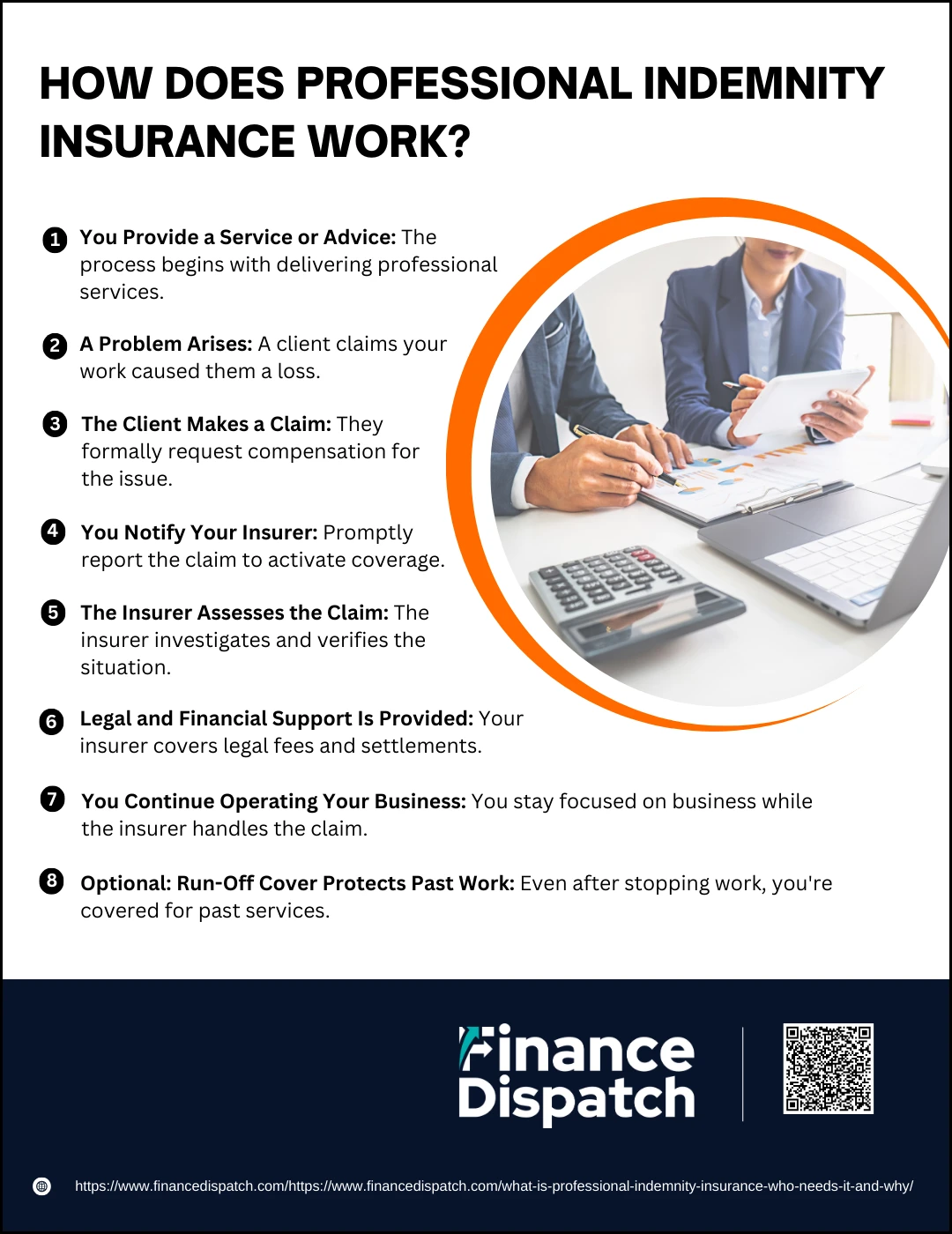 How Does Professional Indemnity Insurance Work?
How Does Professional Indemnity Insurance Work?
Professional indemnity insurance (PI insurance) is a crucial safety net for individuals and businesses that provide professional advice, services, or designs. It helps cover the costs of legal action and compensation if a client claims your work caused them financial loss. While it’s easy to understand what it protects you from, many professionals still wonder how it actually functions in practice. Let’s break it down step by step so you can clearly see how this type of insurance supports you when you need it most.
1. You Provide a Service or Advice
The process begins when you deliver a professional service, whether it’s consultancy, legal advice, financial planning, architectural design, or IT support. Your expertise is what your clients rely on—and it’s also where potential risks can arise.
2. A Problem Arises
Sometimes, despite your best intentions, a client might claim your work caused them a loss. This could be due to a mistake in your calculations, missed deadlines, an overlooked detail in your advice, or even a miscommunication that led to financial consequences.
3. The Client Makes a Claim
The client then makes a formal claim, alleging that your service was inadequate or negligent. This could take the form of a legal notice or a letter requesting compensation. Even if the claim seems unfair or exaggerated, it still needs to be taken seriously and reported.
4. You Notify Your Insurer
Most PI insurance policies operate on a “claims-made” This means your insurer only covers claims that are made and reported while your policy is active. Prompt notification is crucial—even if the issue hasn’t escalated yet, informing your insurer ensures you’re protected if the situation worsens.
5. The Insurer Assesses the Claim
Once you report the issue, your insurance provider investigates the claim. They’ll examine your policy terms, collect supporting documents (contracts, emails, project plans), and assess whether the incident falls under your coverage. The insurer may also appoint legal experts to evaluate the case.
6. Legal and Financial Support Is Provided
If the claim is accepted, your insurer takes over the legal process. They’ll cover solicitor fees, court costs, expert witnesses, and any settlement or damages awarded to the client—up to the limit of your policy. You won’t need to pay these costs from your own pocket, helping to avoid financial strain.
7. You Continue Operating Your Business
With the insurer managing the legal and financial side of things, you can focus on keeping your business running. This reduces stress, avoids lengthy downtime, and ensures one mistake doesn’t derail your entire operation.
8. Optional: Run-Off Cover Protects Past Work
Even after retiring, switching professions, or closing your business, claims can surface years later. Run-off cover provides ongoing protection for work you’ve done in the past, ensuring you’re not left vulnerable to future claims based on previous projects.
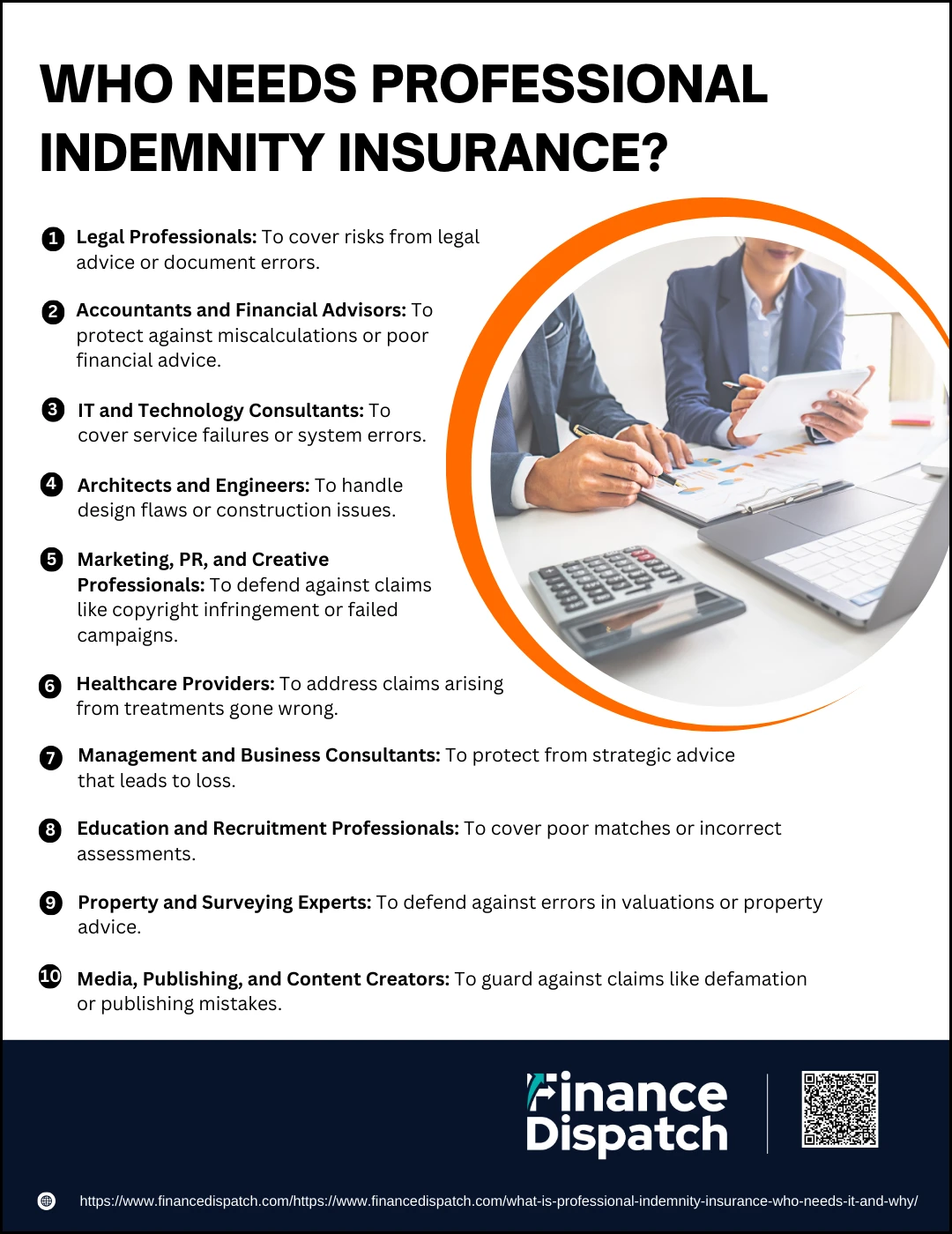 Who Needs Professional Indemnity Insurance?
Who Needs Professional Indemnity Insurance?
If your job involves offering professional advice, handling client information, delivering creative work, or providing services that others rely on, you could be exposed to legal claims if things go wrong. Even when you act with the best intentions, mistakes, miscommunications, or omissions can happen—and that’s where professional indemnity (PI) insurance comes in. It protects your finances, reputation, and business continuity in case a client alleges that your work caused them a loss. While some industries legally require it, many professionals choose to carry PI insurance as a proactive way to manage risk.
Here are some of the key professionals and industries that need professional indemnity insurance:
1. Legal Professionals
Solicitors, legal consultants, and conveyancers routinely advise clients on complex legal matters. A small error in documentation or interpretation can lead to significant financial or legal consequences. PI insurance helps cover claims resulting from alleged mistakes, missed deadlines, or incorrect legal advice. In many jurisdictions, it’s mandatory for practising legal professionals.
2. Accountants and Financial Advisors
These professionals manage money, offer tax advice, and ensure financial compliance. Miscalculations, failure to meet filing deadlines, or inaccurate financial strategies can expose them to costly claims from clients facing penalties or financial losses. Most professional bodies require accountants and advisers to maintain minimum levels of indemnity cover.
3. IT and Technology Consultants
Software bugs, data breaches, downtime, or failed system integrations can quickly disrupt a client’s business. IT consultants, developers, cybersecurity experts, and managed service providers can be held accountable for technical problems that result in financial loss. PI insurance protects them against claims related to service failure or negligence.
4. Architects and Engineers
Design and construction professionals are exposed to risks where errors can result in physical, financial, or safety issues. A miscalculation in a structural design, for instance, can require expensive rectification and even pose risks to public safety. PI cover helps handle claims that may arise from design flaws or project oversights.
5. Marketing, PR, and Creative Professionals
Creative work can be subjective—and legally sensitive. Marketing agencies, graphic designers, copywriters, and PR professionals may face claims related to copyright infringement, libel, misleading content, or failed campaigns. PI insurance covers legal expenses and damages if creative work leads to reputational or financial loss for the client.
6. Healthcare Providers
Beyond medical malpractice, healthcare professionals such as physiotherapists, chiropractors, alternative medicine providers, and private practice nurses can face claims if treatments don’t go as expected. Even non-life-threatening procedures can trigger lawsuits if patients feel harmed or misled. PI insurance offers financial and legal protection in such cases.
7. Management and Business Consultants
Strategic errors, poor advice, or misinterpretation of data can have a major impact on a client’s operations. HR consultants, training specialists, and business analysts can all be blamed if a recommendation backfires. PI cover ensures that if your advice leads to a loss, you’re not left facing legal bills on your own.
8. Education and Recruitment Professionals
From educational consultants and private tutors to recruitment agencies, these professionals are trusted to assess, match, or train individuals. If there’s a failure to deliver on expectations—like a bad job match or incorrect advice—clients may seek compensation. PI insurance helps manage and resolve these types of disputes.
9. Property and Surveying Experts
Professionals like estate agents, chartered surveyors, and property valuers are involved in transactions worth thousands (sometimes millions). Inaccurate assessments or missed defects can lead to huge financial losses for buyers or sellers. Professional indemnity insurance helps these experts manage the risk of claims tied to professional oversight.
10. Media, Publishing, and Content Creators
This group faces unique liabilities—like publishing errors, copyright violations, or defamatory statements. Whether you’re a traditional publisher, a podcaster, or a YouTube content creator, PI insurance can protect you from costly lawsuits that stem from your creative output, both online and offline.
 Key Reasons Why You Might Need It
Key Reasons Why You Might Need It
Professional indemnity insurance isn’t always legally required—but in many cases, it’s strongly recommended or even contractually mandatory. Whether you’re a sole trader, freelancer, consultant, or run a growing business, there are several situations where having PI cover becomes essential. It’s not just about ticking boxes for clients or regulators—this insurance plays a vital role in protecting your finances, reputation, and peace of mind. Below are some of the most common and important reasons why you might need professional indemnity insurance.
1. Regulatory or Industry Requirements
Many professional bodies and regulators require their members to hold a minimum level of PI insurance. This includes industries such as law, finance, architecture, accountancy, and healthcare. Without it, you might not be legally allowed to practice or maintain your membership.
2. Contractual Obligations from Clients
High-value clients or corporate partners often make PI insurance a condition of doing business. Before signing a contract or awarding a project, they may request proof of your coverage to ensure you can compensate them if things go wrong.
3. You Provide Professional Advice or Services
If your business model involves giving recommendations, designing systems, writing reports, or offering consultancy, any mistake or oversight—however small—can result in significant financial losses for your client. This opens the door to claims, even if you provided the service for free.
4. Protection Against Expensive Legal Claims
Legal disputes can arise unexpectedly, and even a single claim can involve thousands in solicitor fees, court costs, and compensation. PI insurance shields you from these financial burdens, allowing you to defend your reputation without draining your business funds.
5. To Safeguard Personal Assets (If Self-Employed)
If you’re a sole trader or partner in a firm with unlimited liability, you could be held personally responsible for paying legal fees and damages. Without PI cover, you might need to use your own savings or assets—such as your home or vehicle—to cover the costs.
6. To Win New Business and Tenders
Being insured can give you a competitive edge. Many organizations prefer to work with professionals who carry PI insurance, as it shows you’re responsible, prepared, and committed to protecting their interests as well as your own.
7. Retiring or Closing Your Business
Claims don’t always arise immediately after a job is completed. Run-off cover is a feature of PI insurance that protects you against future claims related to past work—even after you’ve retired or shut down your business.
What Does It Typically Cover and Not Cover?
Professional indemnity insurance is designed to protect you from the financial consequences of mistakes made while providing professional services or advice. But like any insurance policy, it has limits. Understanding what your policy typically includes—and what it doesn’t—can help you avoid surprises and ensure you’re properly protected. Here’s a breakdown of common inclusions and exclusions under standard PI insurance policies:
| Typically Covered | Not Typically Covered |
| Negligent advice or services — Errors or omissions that cause financial loss | Intentional or fraudulent acts — Deliberate wrongdoing or criminal behavior |
| Defamation or libel — False statements that damage a client’s reputation | Known claims before the policy started — Pre-existing issues |
| Breach of confidentiality — Accidental disclosure of sensitive client information | Claims after the policy expires (without run-off cover) |
| Copyright or trademark infringement — Using protected material without permission | Injuries to employees — Covered under employer’s liability insurance |
| Loss of client documents or data — Misplaced or damaged information | Physical property damage or bodily injury to third parties — Needs public liability cover |
| Legal defence costs — Solicitor fees, court expenses, and settlements | Fines and penalties — Such as tax penalties imposed by government bodies |
| Run-off cover (optional) — Protects against future claims after business closure | Contractual penalties or guarantees — Failing to meet a contract’s financial guarantee |
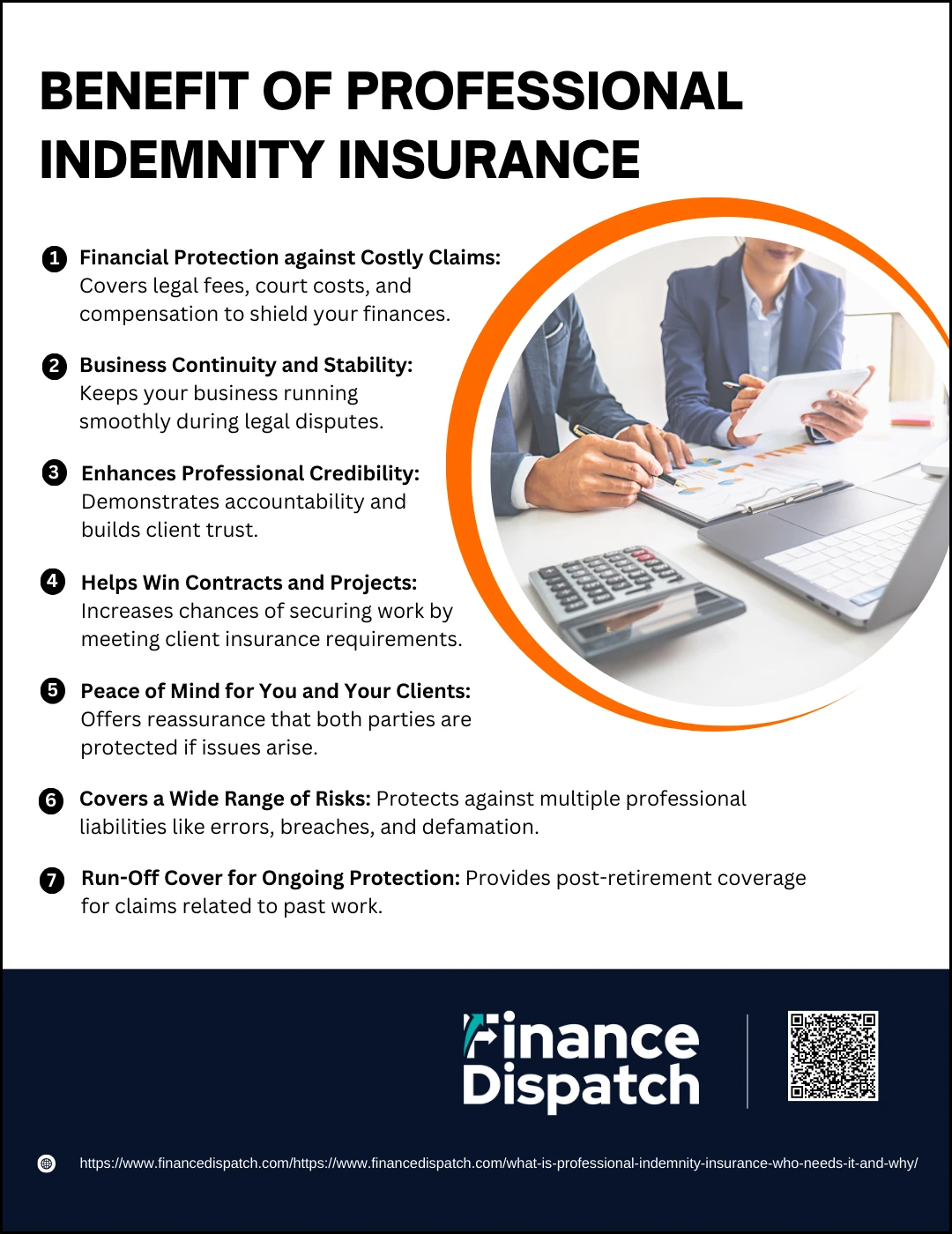 Benefit of Professional Indemnity Insurance
Benefit of Professional Indemnity Insurance
Running a business or offering professional services always carries a degree of risk—even if you’re highly skilled and experienced. A single oversight or misunderstanding can lead to a client claiming financial loss, potentially putting your reputation and livelihood on the line. That’s where professional indemnity insurance proves its worth. It not only offers financial protection but also brings peace of mind, credibility, and long-term stability to your work. Below are some of the most valuable benefits of having professional indemnity insurance.
1. Financial Protection against Costly Claims
PI insurance covers legal defence fees, compensation payouts, and court costs if a client sues you for alleged negligence, errors, or omissions. This prevents your business or personal finances from being drained by unexpected legal expenses.
2. Business Continuity and Stability
Legal disputes can be disruptive and time-consuming. PI insurance allows your business to stay operational while your insurer manages the claim process, helping you maintain focus and momentum.
3. Enhances Professional Credibility
Having PI insurance shows clients that you’re serious about your responsibilities and prepared to make things right if something goes wrong. It adds a layer of trust and professionalism to your brand.
4. Helps Win Contracts and Projects
Clients, especially larger organizations, often prefer working with professionals who are insured. In many cases, proof of PI insurance is a requirement to secure contracts, making it essential for growth and competitiveness.
5. Peace of Mind for You and Your Clients
Knowing that you’re protected if an issue arises gives you the confidence to focus on doing your best work. It also reassures clients that they’ll be compensated in case something goes wrong.
6. Covers a Wide Range of Risks
From defamation and breach of confidentiality to professional errors and accidental data loss, PI insurance typically covers a broad spectrum of common professional risks across industries.
7. Run-Off Cover for Ongoing Protection
Even after you retire or close your business, claims can still emerge. Run-off cover ensures you’re protected from legal action tied to past work, long after your final invoice is sent.
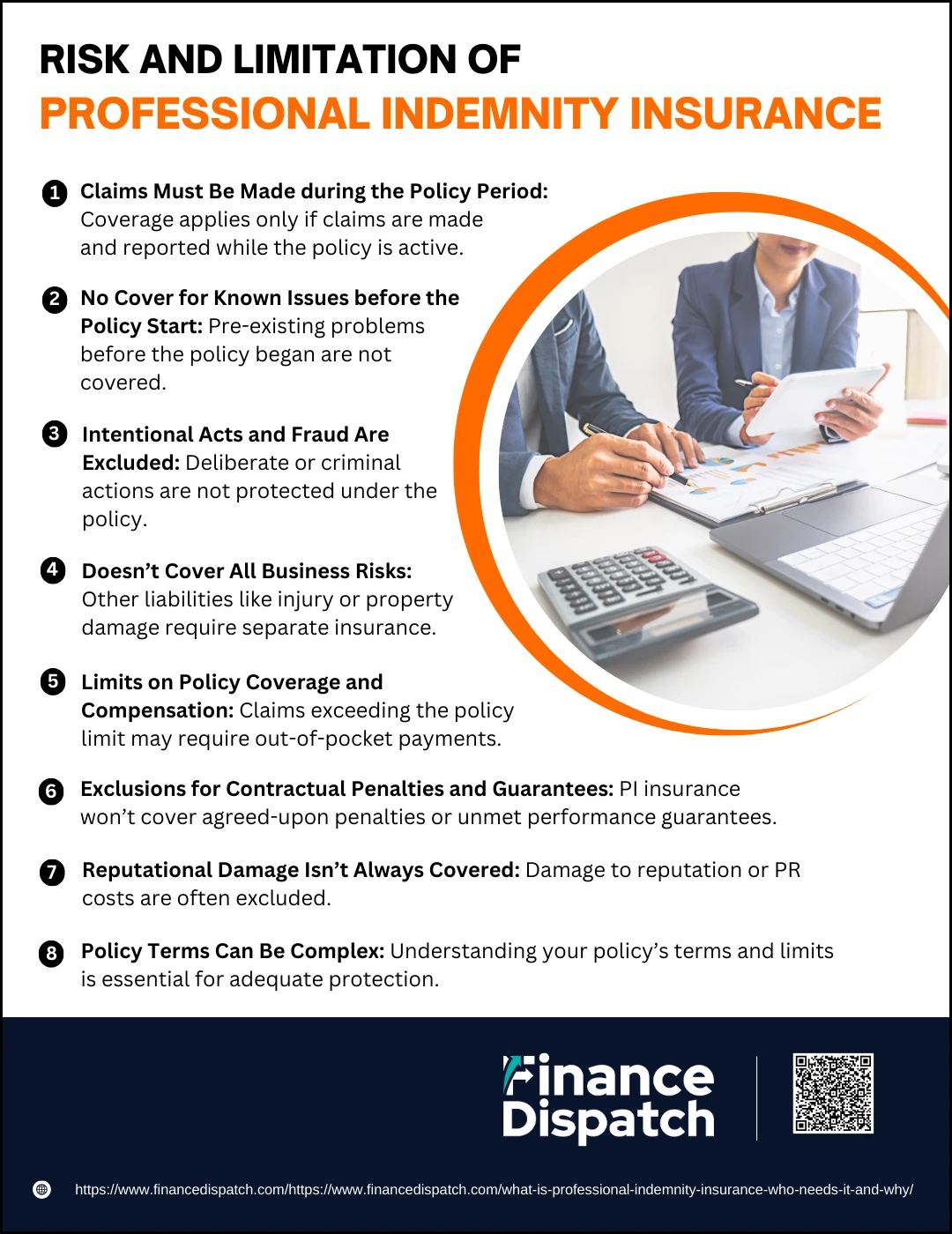 Risk and limitation of Professional Indemnity Insurance
Risk and limitation of Professional Indemnity Insurance
While professional indemnity insurance offers crucial protection for professionals and businesses, it’s important to understand that it doesn’t cover every situation. Like any insurance policy, it comes with exclusions, conditions, and limitations that could affect your ability to make a successful claim. Relying solely on PI insurance without knowing its boundaries can lead to false security. Below are some of the key risks and limitations associated with professional indemnity insurance that every policyholder should be aware of.
1. Claims Must Be Made during the Policy Period
Most PI policies operate on a “claims-made” basis. This means the claim must be both made and reported while your policy is active. If your policy lapses or is cancelled—even if the work was done during the coverage period—you may not be protected unless you have run-off cover.
2. No Cover for Known Issues before the Policy Start
If you were already aware of an issue or complaint before your policy began, any related claim may not be covered. Insurers typically exclude pre-existing circumstances from protection.
3. Intentional Acts and Fraud Are Excluded
PI insurance does not cover claims resulting from deliberate wrongdoing, dishonesty, or criminal acts. If a court finds that your actions were intentional, your insurer may refuse to pay.
4. Doesn’t Cover All Business Risks
Professional indemnity insurance is not a substitute for public liability, employer’s liability, or cyber insurance. It won’t cover physical injury to others, property damage, or data breaches outside the scope of professional advice or service errors.
5. Limits on Policy Coverage and Compensation
Every policy has a financial cap, known as the “limit of indemnity.” If a claim exceeds this amount, you may be responsible for paying the difference. Additionally, aggregate policies may only cover a total amount across all claims in a policy year.
6. Exclusions for Contractual Penalties and Guarantees
If you fail to meet specific performance guarantees outlined in a contract, or are required to pay penalties as part of that agreement, those costs are generally not covered under PI insurance.
7. Reputational Damage Isn’t Always Covered
While the policy may pay for legal costs, it doesn’t necessarily cover reputational harm or the cost of hiring a PR firm to manage public backlash resulting from a claim.
8. Policy Terms Can Be Complex
Understanding the fine print in your policy is crucial. Differences between “any one claim” and “aggregate” limits, or exclusions for certain services, can greatly impact how much protection you actually have.
How Much Does Professional Indemnity Insurance Cost?
The cost of professional indemnity insurance can vary significantly depending on several factors related to your business, industry, and the level of risk involved in your services. There’s no one-size-fits-all price, which is why insurers often tailor policies to suit individual professionals or firms. Understanding the factors that influence the cost of your premium can help you find the right balance between adequate coverage and affordability.
Here are the main factors that affect the cost of professional indemnity insurance:
1. Type of Profession or Industry
High-risk professions like legal services, finance, or architecture typically attract higher premiums due to the complexity and consequences of potential claims.
2. Business Size and Revenue
The more income your business generates, the higher the potential liability—leading to increased insurance costs.
3. Level of Cover Chosen
Policies with higher limits of indemnity will naturally cost more, but may be necessary depending on the value of your contracts or regulatory requirements.
4. Claims History
If you or your business has a history of prior claims, insurers may view you as a higher risk and adjust your premium accordingly.
5. Policy Excess (Deductible)
Choosing a higher excess—what you pay out of pocket before insurance kicks in—can reduce your premium, but increases your upfront cost if a claim is made.
6. Geographic Location and Jurisdiction
Legal and regulatory environments differ across regions, which can influence the likelihood and cost of claims, impacting premiums.
7. Nature and Complexity of Work
Services involving confidential data, complex advice, or high-value contracts may attract higher costs due to increased exposure to liability.
Real-World Examples of PI Claims
Understanding how professional indemnity (PI) insurance works in practice is just as important as knowing what it covers. Real-world scenarios show how everyday professionals—from designers to accountants—can face costly claims even when mistakes are unintentional. These examples help illustrate the value of having PI insurance in place to manage the legal and financial fallout from such incidents.
Here are some real-world examples of professional indemnity claims:
1. Architect’s Design Flaw: An architect recommended a building material that turned out to be unsuitable for the structure. The building had to be partially redone, and the client claimed the cost of rectification. The architect’s PI insurance covered the legal defence and the cost of the remedial work.
2. Advertising Agency’s Printing Error: A marketing firm printed thousands of flyers for a client, only to discover they had used the wrong phone number and email address. The mistake led to a full reprint at the agency’s expense, which was covered by their PI policy.
3. Accountant’s Missed Deadline: An accountant failed to file a client’s tax return on time, resulting in a penalty from the tax authority. The client sued the accountant for the loss, and the PI insurance paid both the penalty and the associated legal fees.
4. Graphic Designer’s Material Failure: A designer created tags for a Christmas tree seller that were meant to withstand outdoor conditions. However, the tags failed in bad weather, ruining a major product batch. The client sued for the loss, and the designer’s PI insurance covered compensation costs.
5. Surveyor’s Overlooked Issue: A property surveyor missed a serious structural defect in a building. After the sale, the buyer discovered the issue and sued the surveyor for the repair costs. The PI insurance paid for the defence and the damages awarded.
6. Consultant’s Faulty Advice: A business consultant gave strategic advice that led to financial losses for the client. Although the advice was given in good faith, the client pursued a claim, and the consultant’s PI insurance helped cover the settlement.
Conclusion
Professional indemnity insurance is more than just a safeguard—it’s a critical part of responsible business practice for anyone offering advice, services, or expertise. From covering legal costs and compensation to protecting your reputation and helping you maintain client trust, PI insurance offers peace of mind in an unpredictable world. Whether it’s required by your industry or simply a smart business decision, having the right cover in place ensures you can focus on what you do best—knowing you’re protected if something goes wrong.



